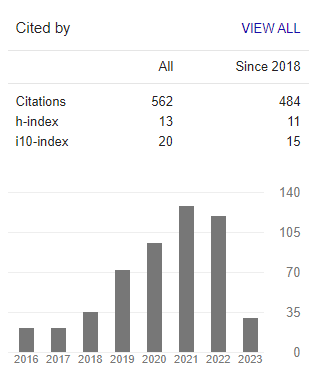BIOPOLITIK DAN GERAKAN LITERASI KOMUNIKATIF KAUM MUDA
Abstract
The current demographic bonus is often thought of as a "golden opportunity" for the nation to align itself with other nations. Population growth, especially productive age, will be a key measure in improving the country's productivity. But in the modern Biopolitical Era, it can be a "threat" to the democratic life and public criticism. This paper attempts, critically explores how biopolitical regimes work in controlling the socio-political life of society. Ranging from cultural issues in the post-tradition era, emancipation politics, the digital world, to the social life of public spaces/ spheres, will be the main focus. Alternatively, the idea of youth literacy becomes an offer in reading/ writing various issues of the nation that depart from the roots of everyday life.
To cite this article (7th APA style):
Faisal, A. (2018). Biopolitik dan Gerakan Literasi Komunikatif Kaum Muda [Biopolitics and the Communicative Literacy Movement of Youth]. Journal Communication Spectrum, 8(1), 72-93. http://dx.doi.org/10.36782/jcs.v8i1.1813Keywords
References
Agamben, G. (1995). Homo Sacer: Sovereign Power and Bare Life. Standford Univ. Press
Badiou, A. (2004). Infinite Thought. Continuum
Barthes, R. (1993). Image, Music, Text. Hill & Wang
Bauman, Z. (2005). Liquid Life. Polity Press
Bohman, J. (2004). Expanding Dialogue: The Internet, the Public Sphere and Prospects for Transnational Democracy. Dalam Nick Crosley & John M Roberts (eds), After Habermas: New Perspectives on the Public Sphere (hal. 131-132). Blackwell Publishing
Certeau, M. de. (1988). The Practice of Everyday Life. University of California Press
Davidson, J. S., Henley, D. & Moniaga, S. (2010). Adat dalam Politik Indonesia. Yayasan Pustaka Obor Indonesia & KITLV-Jakarta.
Dean, J. (2003). Why the Net is Not a Public Sphere. Dalam Constellations, Volume 10, No 1 (hal. 97-101). Blackwell Publishing,
Debord, G. (1990). The Society of Spectacle. Zone Books
Felski, R. (1999). The Invention of Everyday Life. Cool Moves, Journal of Culture/Theory/Politics, 39.
Foucault, M. (1975). Surveiller et Punir. Gallimard
Foucault, M. (1977). Discipline and Punish. Pantheon Books
Foucault, M. (2008). The Birth of Biopolitics: Lecturers at the College de France 1978-1979. Palgrave Macmillan
Furedi, F. (2009). Dalam Yudi latif, 2009, Menyemai Karakter Bangsa. Kompas
Giddens, A. (1991). Modernity and Self-Identity: Self and Society in the Late Modern Age. Polity Press
Giddens, A. (1998). The Third Way: the Renewal of Social Democracy. Polity Press
Gramsci, A. (2006). Selection from the Prison Notebooks.
Hadiz, V. R. (2005). Dinamika Kuasaan Ekonomi Politik Pasca Suharto. LP3S
Juditha, C. (2013). Tingkat Literasi Media Masyarakat di Wilayah Perbatasan Papua. Journal Communication Spectrum, 3(2), 107-120
Lefebvre, H. (1984). Everyday Life in the Modern World. Transaction
Lefebvre, H. (1991). Critique of Everyday Life: Introduction, Vol. 1. Verso
Lefebvre, H. (2008). Critique of Everyday Life: Foundations for a Sociology of the Everyday, Vol. 2. Verso
Lemke, T. (2011). Bio-Politics: An Advance Introduction. New York University Press
Marchart, O. (2007). Post-Foundational Political Thought: Political Difference in Nancy, Lefort, Badiou & Laclau. Edinburgh University Press
Nasution, I. & Agustinus, R. (eds) (2006). Restorasi Pancasila: Mendamaikan Politik Identitas dan Modernitas. Brighten Institute
Palfrey, J. & Gasser, U. (2008). Born Digital: Understanding the First Generation of Digital Natives. Basic Books
Piliang, Y. A. (2005). Transpolitika: Dinamika Politik di dalam Era Virtualitas. Jalasutra
Robet, R. (2010). Manusia Politik: Subjek Radikal dan Politik Emansipasi di Era Kapitalisme Global menurut Slavoj Zizek. Marjin Kiri
Robet, R. & Agustinus, R. (eds). (2008). Kembalinya Politik: Pemikiran Politik Kontemporer dari (A)rendt Sampai (Z)izek. Marjin Kiri.
Sassi, S. (2001). The Transformation of the Public Sphere. Dalam Barrie Axford dan Richard Huggins (eds), New Media and Politics (hal. 100-101). Thousands Oaks
Spark, C. (2001). The Internet and the Global Public Sphere. Dalam W.L Bennet dan R.M.Entman (eds), Mediated Politics: Communication in the Future of Democracy (hal. 105). Cambridge University Press
Spivak, G. (1998). Can the Subaltern Speak? Dalam Cary Nelson & Lawrence Grossberg (eds), Marxism and The Interpretation of Culture. Macmillan Education
Stack, J. D. (1996). The Theory and Method of Articulation in Cultural Studies. Dalam David Morley & Kuang-Hsing Chen (eds), Stuart Hall: Critical Dialogues in Cultural Studies (hal. 112-127).
Storey, J. (1996). Cultural Studies and The Study of Popular Culture: Theories and Methods
Supeli, K. (2013). Kebudayaan dan Kegagapan Kita. Dalam Mirwan Andan dan Martin Suryawijaya (eds), Imajinasi Kebudayaan: Kompilasi Pidato Kebudayaan Dewan Kesenian Jakarta 1998-2013. Perhimpunan Koalisi Seni Indonesia
Tapscott, D. (2009). Grown Up Digital: How the Net Generation is Changing Your World. McGrow Hill
Turkle, S. (2005). The Second Self. MIT Press
Volosinov, V. (1973). Marxism and The Philosophy of Language. Harvard Univ. Press
Wattimena, R. A.A. (2016). Demokrasi: Dasar Filosofis dan Tantangannya. Kanisius
Zizek, Z. (2003). Introduction. Dalam Peter Hallward, Badiou: A Subject to Truth. University of Minnesota Press
Refbacks
- There are currently no refbacks.

This work is licensed under a Creative Commons Attribution 3.0 License.
Indexed by:
Archived in:
Listed in:
INTERNATIONAL ASSOCIATION FOR MEDIA AND COMMUNICATION RESEARCH

















